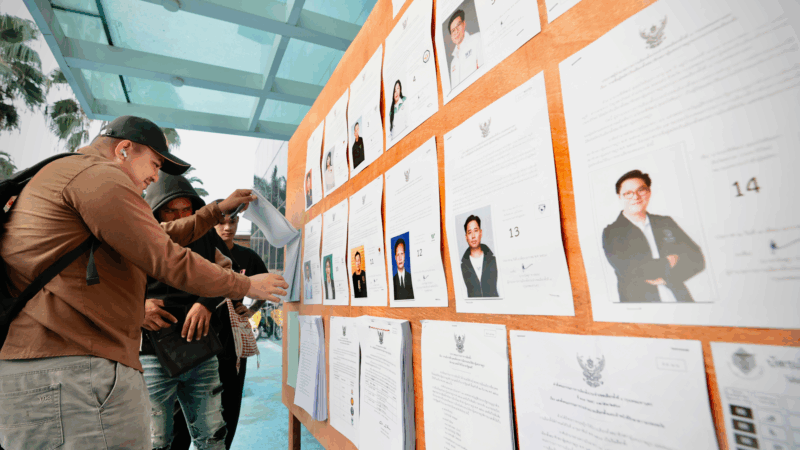Coverage of Alabama’s Immigration Law HB56
Alabama’s immigration law is grabbing headlines again following the U.S. Supreme Court’s ruling on a similar law in Arizona. For more than a year, Alabama has been the center of change concerning immigrants living in the state. Alabama House Bill 56 (HB 56) was signed into law in June 2011. Based on bills passed in Arizona and Georgia, this anti-illegal immigration bill came into effect in late September 2011. Here is WBHM’s coverage of the events surrounding the law.
How Will the Immigration Case Affect Alabama?: Now that the Supreme Court has struck down most of Arizona’s Law, lawmakers in Alabama are trying to determine what the ruling means for people there. Alabama’s immigration law is seen to be even stricter than Arizona’s law. But as WBHM’s Andrew Yeager reports, the pending ruling may not be as simple as that. (June 26, 2012)
Changes to Arizona’s Immigration Law: A Supreme Court decision both striking down and upholding parts of Arizona’s immigration policy could mean changes for Alabama. The court voted to keep the law that calls for police to check the immigration status of people they stop on the road, but voted down two other parts on claims that they were unconstitutional– still, it seems that both sides of the conflict are at least partially satisfied with the ruling. WBHM’s Andrew Yeager reports as part of a one-hour special from KJZZ in Phoenix. (June 25, 2012)
Legislature Considers Immigration Law Tweaks: The Alabama Legislature begins its regular session today and one of the big issues lawmakers will consider is changing the state’s immigration law. That law, HB56, is considered the nation’s toughest crackdown on illegal immigrants. When it passed last year it got very little attention from Alabama’s business community, but as WBHM’s Tanya Ott reports, business leaders are driving the latest efforts to modify the law. (Feb. 7, 2012)
Farm Guest Workers: Alabama farmers are wondering where they’ll find workers for next year’s growing season. They say the state’s tough immigration law has driven away much of the migrant labor they rely on. One option is for farmers to hire foreign guest workers. And as WBHM’s Andrew Yeager reports, a number of private companies stand to benefit. (Dec. 22, 2011)
Alabama Immigration Law Attracts Washington Attention: Pressure is mounting against Alabama’s “toughest in the nation” immigration law. last week, a group of national labor leaders visited the state to protest the law. And last night, nearly 3,000 immigrants and supporters converged on a church with strong ties to the civil rights movement. As WBHM’s Tanya Ott reports they heard from Democratic members of Congress who vow to get the law repealed. (Nov. 22, 2011)
Alabama Immigrants: Skilled or Unskilled Labor?: One of the consequences of Alabama’s new “toughest in the nation” immigration law is a flight from the workplace. Immigrants (both undocumented and documented-but-scared) are leaving farms, processing plants, and construction sites. And leaving employers in a bind.
Last month, the state launched a program to match unemployed Alabamians with suddenly-open jobs. There were few takers. When he launched the program, Governor Robert Bentley bristled at the notion that Alabamians are unwilling to do “hard work”. Birmingham Attorney Richard Newton says he doesn’t doubt that, but the Governor misses a fundamental point. (Nov. 8, 2011)
Dan Carsen Interviewed Re Immigration Law on “The Takeaway”: Education reporter Dan Carsen is interviewed by PRI’s “The Takeaway”about the latest immigration-law dust-up between the U.S. Department of Justice and Alabama Attorney General Luther Strange. (Nov. 7, 2011)
Strange Rebuffs DOJ Again: In the latest chapter of a blunt back-and-forth over Alabama’s immigration law, state Attorney General Luther Strange on Friday again rebuffed the U.S. Department of
Justice over access to student information. (Nov. 5, 2011)
IMMIGRATION LAW: State AG Balks at DOJ Request: The U.S. Department of Justice, concerned about the new immigration law, has requested enrollment data from district superintendents across Alabama. But it’s unclear when or whether that information will be provided, as state Attorney General Luther Strange balked at the request. (Nov. 2, 2011)
Max’s Delicatessen & the Immigration Law: Alabama’s new immigration law has been in the news a lot lately. There’ve been stories about police setting up road blocks outside immigrant neighborhoods and how schools are losing students. But this month one businessman has found himself at the center of the controversy – in a spotlight he never anticipated – or wanted. WBHM’s Tanya Ott reports. (Oct. 28, 2011)
Immigration Law and Schools: Trying to Calm Fears: Across Alabama, people have been marching to spotlight children affected by the state’s strict new immigration law. The measure requires schools to record the immigration status of newly enrolled students. After more than 2,000 Hispanic students were absent from Alabama schools early last week, activists and educators are reaching out to families worried about what the law will mean for them. Dan Carsen has more from the Southern Education Desk at WBHM. (Oct. 9, 2011)
Deciphering Alabama’s Immigration Law: Now that a federal judge has allowed most of Alabama’s tough new immigration law to go into effect, lawyers, police and immigrants themselves are trying to figure out just how the law is applied. WBHM’s Andrew Yeager spoke about what some parts of the law mean with Zayne Smith. She’s the immigration policy director with Alabama Appleseed. (Oct. 4, 2011)
Immigration Law and Schools: Students, parents, and school officials are reacting to Alabama’s new immigration law, the toughest in the nation. The law went into effect last week after a federal judge upheld many of its most controversial provisions, including a requirement that schools check the immigration status of newly enrolled students. And that extra layer of administrative responsibility may pale in comparison with the fear it’s engendered. Dan Carsen has more from the Southern Education Desk at WBHM. (Oct. 3, 2011)
A Challenge to Alabama’s Immigration Law: Opponents of Alabama’s new immigration law spent Wednesday in federal court trying to convince a judge to block the measure from going into effect on September first. The legal showdown over what’s been called the toughest crackdown on illegal immigration in the country pits the U.S. Justice Department, a coalition of civil rights groups and church leaders against attorneys for the state of Alabama. They argue there’s no reason the law shouldn’t take effect as planned. NPR National Correspondent Debbie Elliot is watching the action at the federal courthouse in Birmingham and spoke with WBHM’s Andrew Yeager. (Aug. 24, 2011)
Alabama’s New Immigration Law and Schools: Alabama’s new immigration law has been at the center of heated debate in the state, across the country, and beyond. Of many controversial provisions is one that requires schools to determine the immigration status of students, and in some cases, their parents. Some educators are uneasy with that new role. That’s to say nothing of the feelings of many immigrants, legal and otherwise. (June 24, 2011)
Alabama’s Immigration Bill: The Alabama House is set to take up bill today aimed at curbing illegal immigration. It’s patterned after a similar law passed last year in Arizona and would punish individuals in Alabama without documentation for trespassing. That could mean jail, fines or being turned over to federal immigration authorities. WBHM’s Andrew Yeager talks to some in the business community who are worried about what an Arizona-style law might mean for Alabama. (April 5, 2011)
Thailand counts votes in early election with 3 main parties vying for power
Vote counting was underway in Thailand's early general election on Sunday, seen as a three-way race among competing visions of progressive, populist and old-fashioned patronage politics.
US ski star Lindsey Vonn crashes in Olympic downhill race
In an explosive crash near the top of the downhill course in Cortina, Vonn landed a jump perpendicular to the slope and tumbled to a stop shortly below.
For many U.S. Olympic athletes, Italy feels like home turf
Many spent their careers training on the mountains they'll be competing on at the Winter Games. Lindsey Vonn wanted to stage a comeback on these slopes and Jessie Diggins won her first World Cup there.
Immigrant whose skull was broken in 8 places during ICE arrest says beating was unprovoked
Alberto Castañeda Mondragón was hospitalized with eight skull fractures and five life-threatening brain hemorrhages. Officers claimed he ran into a wall, but medical staff doubted that account.
Pentagon says it’s cutting ties with ‘woke’ Harvard, ending military training
Amid an ongoing standoff between Harvard and the White House, the Defense Department said it plans to cut ties with the Ivy League — ending military training, fellowships and certificate programs.
‘Washington Post’ CEO resigns after going AWOL during massive job cuts
Washington Post chief executive and publisher Will Lewis has resigned just days after the newspaper announced massive layoffs.






